The latest surge in tech stocks, particularly after a turbulent initial response to President Donald Trump’s tariff announcements, raises an eyebrow for many seasoned investors. While optimism has flourished following temporary tariff reductions and a slew of promising earnings reports, all signs point to a precarious situation. As much as we should celebrate the short-term victories in the market, it’s crucial to recognize the risks lurking beneath this facade of recovery. The current enthusiasm, especially surrounding giant players like Microsoft and Meta Platforms, feels prematurely exuberant.
Despite the recent uptick, there is an undeniable fragility observed through technical analysis, particularly through the 14-day Relative Strength Index (RSI). When assessing market momentum, an RSI above 70 typically suggests overbought conditions—indicating that a stock may be heading for a correction. Microsoft, for example, recently hit a near-maximum RSI of 72.78, a clear signal that the stock could be due for a downturn. What goes up must come down, and the impending reality of correction makes me skeptical of long-term value in these stocks despite their recent performance.
The Earnings Mirage: Are Investors Misled?
While reports of positive earnings are bound to excite investors, one must ask: are these gains sustainable? Microsoft’s robust growth, driven primarily by its Azure platform and AI enthusiasm, should be met with cautious scrutiny. The market’s newfound faith in tech isn’t unfounded, but rather than unbridled enthusiasm, a more tempered outlook would serve investors better. As a center-right liberal, I believe that it’s essential for economic optimism to be underpinned by solid fundamentals rather than just speculative momentum driven by buzzwords like “artificial intelligence.” Investing should mirror prudence, not impulse.
The allure of AI and tech innovation is compelling, yet it’s troubling to consider that companies such as Palantir—despite growing significantly this year—are not immune to steep corrections. Analysts predict a potential 27% drop for Palantir shares from current levels, despite enjoying a strong year due to U.S. government contracts. This juxtaposition of success on one hand and analyst pessimism on the other should prompt investors to question the rationality of this recent frenzy. Are we witnessing a genuine renaissance in technology, or are stakeholders engaging in wishful thinking?
The Rise of Other Overbought Players
It’s not just Microsoft that has garnered attention; the RSI indicators for other players like Netflix and VeriSign are alarmingly high—over 74 in both cases. Netflix’s record-setting performance with an 11-day streak of gains creates a seemingly unstoppable momentum. Nonetheless, placing too much faith in such streaks often leads to disappointment. The market operates in cycles, and the inevitability of a contraction can’t be ignored; it’s a natural part of the economic rhythm. While short-term bursts of performance delight traders, they can also mislead retail investors into buying at inflated prices, ultimately resulting in painful corrections.
Moreover, the performance disparity raises questions about the broader market’s sustainability. As some stocks rocket into the stratosphere, many others languish in oversold territory. Take UnitedHealth Group, for instance—down nearly 21% this year due to increased medical costs and plummeting profit forecasts. Environments that reward a few select players while leaving many behind breed instability. A balanced market, where growth is widespread and not concentrated, is essential for long-term economic health.
In a politically charged environment where market sentiments oscillate rapidly, the responsibility falls upon investors to navigate these waters with a balanced approach. Yes, the tech industry has shown remarkable adaptability, but the lurking risks and economic markers signal a call for vigilance among stakeholders. The intoxicating highs may distract us from the red flags and achieveadiate a simplistic view of the upward trajectory. And while it’s vital to celebrate progress where it exists, the insistent pressure for measured investments, borne from thorough understanding, cannot be overstated.

